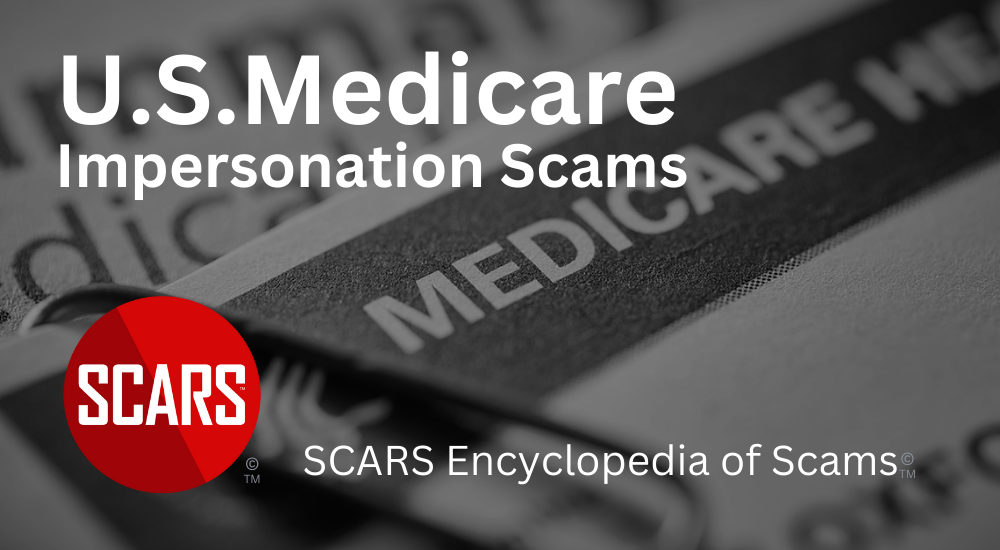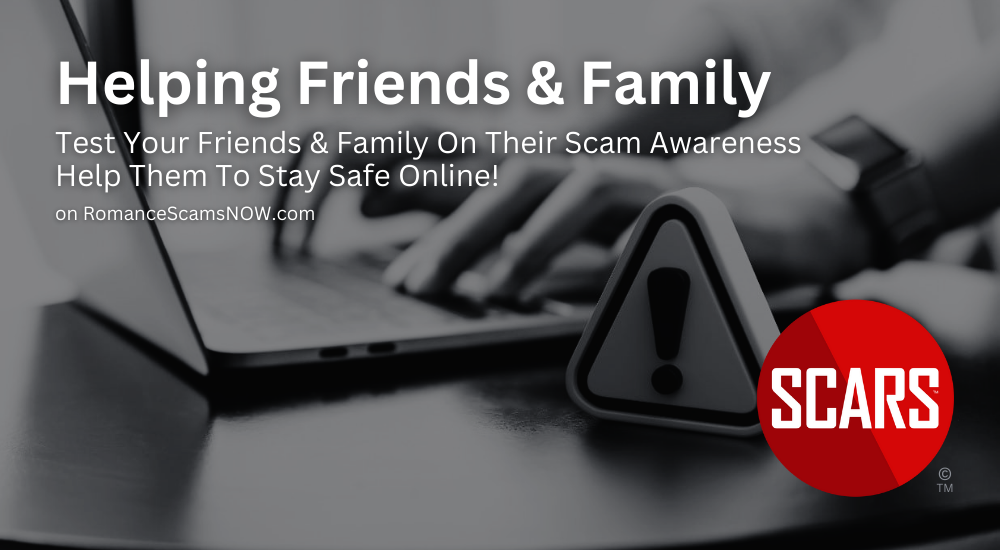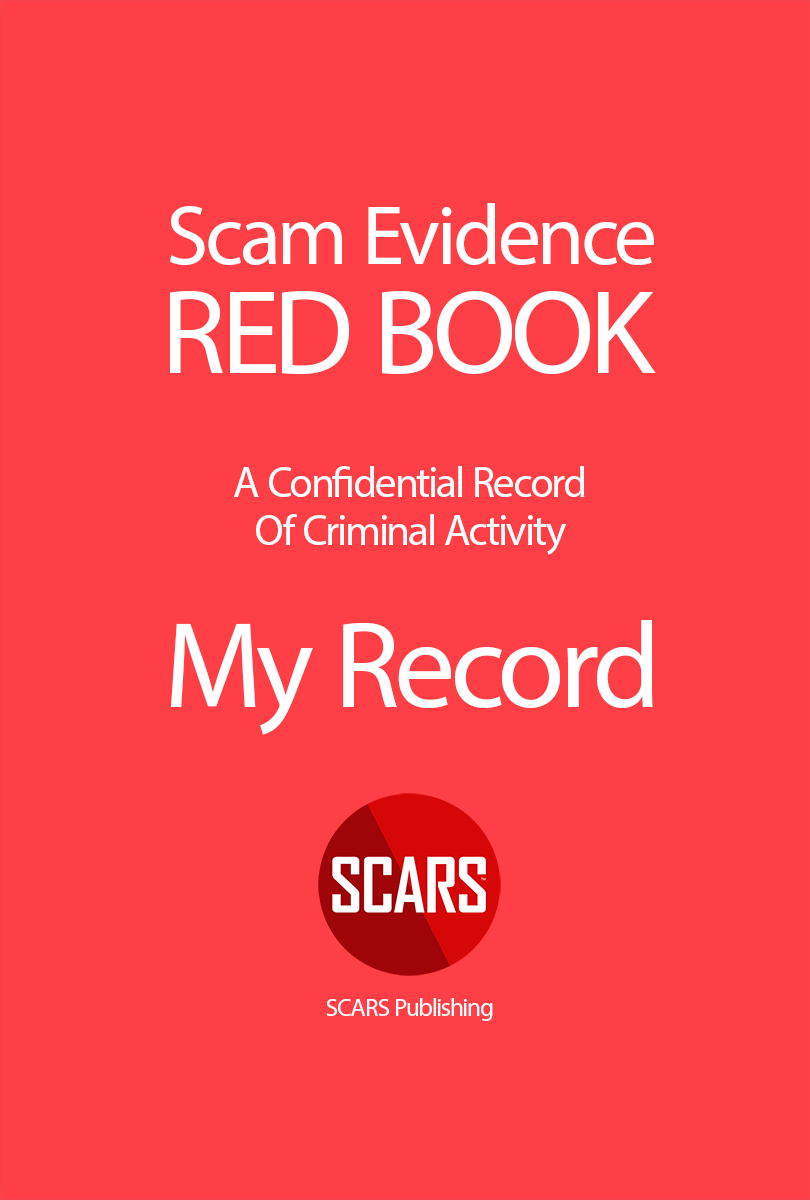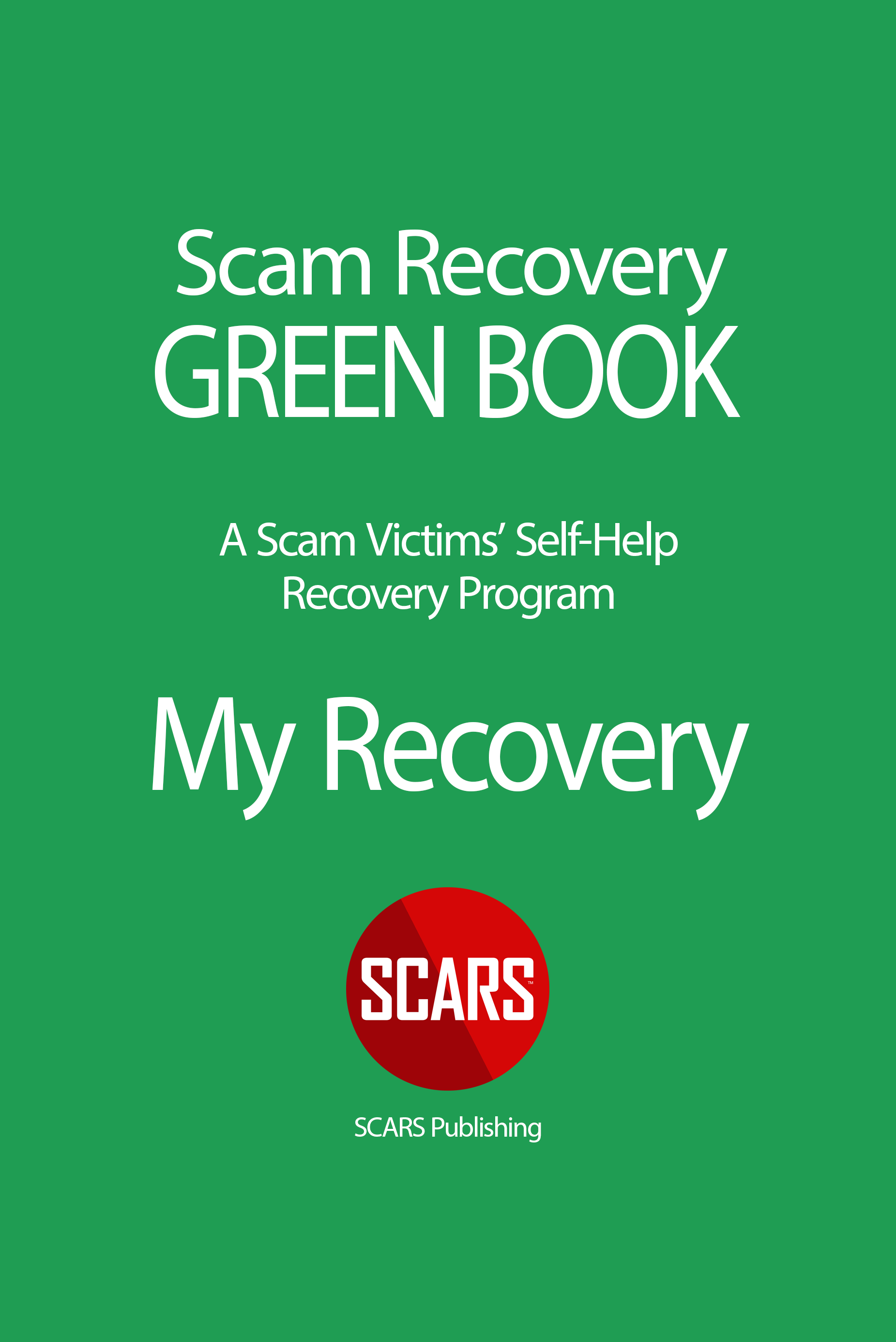
SCARS Institute’s Encyclopedia of Scams™ Published Continuously for 25 Years

Anti-Scam Test For Your Friends And Family – Helping Them Stay Safe
Test Your Friends and Family to See If They Know What to Do!
How Scams Work – A SCARS Insight
Article Abstract
Corporations test for scam susceptibility to protect their organizations; you can do the same for your friends and family. This article guides you through two tests designed to assess their awareness and response to phishing and social media scams.
For the phishing test, create a new Gmail account resembling a technical support email and send a fake phishing email to your contacts. Observe their responses to gauge their vulnerability.
For the social media scam test, create a fake social media profile using the new Gmail account, send friend requests to your contacts, and see who accepts. Both tests aim to identify weaknesses in scam awareness and educate your loved ones about staying safe online.
These exercises help reinforce the importance of vigilance and informed decision-making in digital interactions.

Do you want to Save your Friends and Family from Scammers? Test their Skills!
Corporations help keep their organization and employees safe by testing for susceptibility to scams and fraud, you can help your friends and family stay safe by doing the same thing. Since you are now better aware of the risks, you can turn that knowledge into a tool to help them be more aware and safer.
In this article, we have designed two tests that you can perform with your family and friends.
Requirement:
Create a NEW GMAIL account ‘support2345@gmail.com’ use any numbers you want
You want this to look like a platform technical support email address. This is how scammers do this.
DO NOT DO THIS WITH YOUR EXISTING GMAIL ACCOUNT
TEST 1: Phishing Scams
Phishing Awareness Test for Family and Friends: Introduction
Phishing scams are a common and dangerous form of cyberattack. To help your family and friends stay safe, use this test to assess their ability to recognize phishing emails and provide them tips to improve their cybersecurity awareness. This test consists of a phishing scam test, and then multiple-choice questions and practical exercises you can ask them afterward.
THE TEST
Using your new Gmail account send this email to your friends and family.
Do not include any words in [ ] Add their name where the < > are – do not include the < >
[From] support2345@gmail.com [your new gmail email address]
[Subject] Immediate Action Required: Account Verification [copy that] [EMAIL BODY]Dear ,
Your account has been flagged for suspicious activity. Please verify your account information immediately to avoid suspension. Click here to verify: http://verify.gmail.com
If you have any problems, please reply and we will assist you. In your reply, please include:
• Your full name
• Your phone number
• City, State, and postal code where you live
• The name of your internet service providerThank you,
Gmail Support Team
The purpose of this is to see if they fall for a basic phishing scam. The website link goes nowhere so it is completely safe. Since the link will not work, if they follow the instructions and reply, you know they fell for it. If it had been a real scammer, that would have been enough to take over their internet account and steal their identity.
Suspicious Elements In The Email:
-
- The email address ‘support2345@gmail.com’ is a Gmail domain. This should be enough to catch many people – but it is not an official Google support domain.
- The subject line creates urgency and demands immediate action.
- The link provided is not the official website, but it looks official. It does not work. So they only have the option of replying to get resolution.
The Follow Up
Instructions
Ok, if they reply, you caught them engaging with a phishing email. Now what?
If your friend or family member is local, then we suggest visiting them to explain what happened. Tell them you were testing everyone you know to help them be safe online. You can show them the following questions to see what they can identify.
If your friend is not local, then call them and explain that you were doing a phishing scam test to help all of your friends and family stay safe online. Explain that you will send them (from your real email address) some information to help them avoid this in the future. Using your real email address, send them an email with the questions below – send just one question at a time without the answers. Let them respond and then you can reply with the correct answer.
Recognizing Common Phishing Indicators, Identifying Suspicious Links and Attachments, and General Cybersecurity Practices
Question 1: Which of the following email subjects is most likely to be a phishing attempt?
-
-
-
- “Your Amazon order has been shipped”
- “Important: Update your payment information immediately!”
- “Monthly Newsletter from your local gym”
- “Reminder: Upcoming dental appointment”
-
-
Correct Answer: B
Explanation: Phishing emails often create a sense of urgency and ask for sensitive information like payment details.
– – –
Question 2: What is a common characteristic of a phishing email?
-
-
-
- The sender’s email address matches the company’s official domain.
- The email contains poor grammar and spelling errors.
- The email asks you to visit the company’s official website.
- The email provides detailed order information.
-
-
Correct Answer: B
Explanation: Many phishing emails contain spelling and grammatical errors, which can be a red flag.
– – –
Question 3: How should you check a link in an email before clicking it?
-
-
-
- Click the link to see where it takes you.
- Hover over the link to see the URL preview.
- Copy and paste the link into your browser’s address bar.
- Assume it’s safe if it looks familiar.
-
-
Correct Answer: B
Explanation: Hovering over the link allows you to see the actual URL without clicking it, helping you identify suspicious links.
– – –
Question 4: What should you do if you receive an unexpected attachment from a known contact?
-
-
-
- Open it immediately to see what it is.
- Reply to the email asking for confirmation.
- Ignore the email.
- Scan the attachment with antivirus software before opening it.
-
-
Correct Answer: D
Explanation: Scanning attachments with antivirus software can help detect and prevent malware infections.
– – –
Question 5: What should you do if you receive a suspected phishing email?
-
-
-
- Reply to the email asking for more information.
- Delete the email immediately.
- Forward the email to the company’s official support address and report it. Such as ‘abuse@gmail.com’
- D. Ignore the email and move on.
-
-
Correct Answer: C
Explanation: Reporting the phishing attempt helps the company take action and protect other users from similar attacks. Note that most email platforms, such as Gmail, Outlook, and others have a way to flag emails as phishing scams now so you do not need to forward it, just flag it in their app.
– – –
Question 6: After clicking a suspicious link, what is the first action you should take?
-
-
-
- Close your browser and ignore it.
- Change your passwords immediately.
- Disconnect from the internet and run a security scan.
- Bookmark the link for future reference.
-
-
Correct Answer: C
Explanation: Disconnecting from the internet and running a security scan helps prevent further damage and detects any potential malware.
– – –
Question 7: Which of the following practices can help protect against phishing attacks?
-
-
-
- Using the same password for multiple accounts.
- Regularly updating your software and antivirus programs.
- Sharing your passwords with trusted friends.
- Ignoring emails from unknown senders.
-
-
Correct Answer: B
Explanation: Keeping your software and antivirus programs updated ensures you have the latest security patches and protections.
– – –
Question 8: What is the most secure way to verify an email’s legitimacy if you are unsure?
-
-
-
- Call the sender using a phone number from their official website.
- Reply to the email asking for verification.
- Forward the email to your friends for their opinion.
- Search the email content online for similar scams.
-
-
Correct Answer: A
Explanation: Contacting the sender using information from their official website ensures you are communicating with the legitimate entity.
We hope that you also learned something in the test as well!
TEST 2: Social Media Scams
The online world is not full of scammers, and the sad fact is that most of the people you know will become a victim!
But there are things you can do to help them to stay safe online. This next test will see how they respond to stranger friend or connection requests. It can be done on any social platform, wherever your friends and family are online.
THE TEST
Using your new Gmail account create a new social media account and send friend/contact requests to your friends and family.
You can do this with Facebook, Instagram, TikTok, LinkedIn, etc.
STEP 1: Create the New Account
Create a new social media account on the platform you and they use.
Create a new Facebook account (for example) using your new Gmail address – then share a couple of things from other pages or profiles so you have a couple of posts in your new profile timeline/feed/wall, and use a fake graphic as your profile image – we suggest photos of puppies or kittens.
STEP 2: Authenticity
-
-
- Find your original profile and send a friend request so you give access to your real profile and all of your friends and family. This will also let you see what others can see in your profile.
- Log out of the new profile and log into your original profile and accept your Friend/Contact Request – this creates authenticity because the new fake profile is connected to someone they will know.
-
STEP 3: Send the Friend/Connection Request
-
-
- Go back to your new fake profile
- Send Friend Requests to all of your real friends and family from the fake profile!
- See how many actually accept the friend request.
-
Results & Conclusion:
Every one of your friends and family who accepted the fake profile friend request could already be a victim of a scammer because they accept friend requests from people they don’t know.
You don’t have to tell them the fake profile was you. You can tell them that they accepted a fake profile as a friend, and what if it had been a scammer or worse?
Talk to them about what this means, and that when they accepted the fake as a friend they gave the fake access to all of their friends too!
Help them understand how dangerous fake profiles are, and how to protect yourself from them.
This is especially important if children accept the fake friend request.
Summary
YOU have to do more to fight against scammers and one way to do that is to help your friends and family understand the risks. Educate them and warn them.
We would love to hear how this went for you. Please share your results in a comment!
More:
- How To Recognize, Avoid, and Report Phishing Scams (romancescamsnow.com)
- QR Codes Are The New Phishing Attack Method – Quishing – 2024 (romancescamsnow.com)
- Phishing, Vishing, or Smishing – Phishing Scam Types – What Is The Difference? (romancescamsnow.com)
- BazarCall Scams: Call Centers Playing A Roll In Phishing & Ransomware Attacks (romancescamsnow.com)
- Phishy Emails – Phishing Scams Guest Article by Dana Mantilla (romancescamsnow.com)
- Phishing Email Scams (romancescamsnow.com)
-/ 30 /-
What do you think about this?
Please share your thoughts in a comment below!
LEAVE A COMMENT?
Recent Comments
On Other Articles
- velma faile on Finally Tax Relief for American Scam Victims is on the Horizon – 2026: “I just did my taxes for 2025 my tax account said so far for romances scam we cd not take…” Feb 25, 19:50
- on Reporting Scams & Interacting With The Police – A Scam Victim’s Checklist [VIDEO]: “Yes, this is a scam. For your own sanity, just block them completely.” Feb 25, 15:37
- on Danielle Delaunay/Danielle Genevieve – Stolen Identity/Stolen Photos – Impersonation Victim UPDATED 2024: “She goes by the name of Sanrda John now” Feb 25, 10:26
- on Reporting Scams & Interacting With The Police – A Scam Victim’s Checklist [VIDEO]: “So far I have not been scam out of any money because I was aware not to give the money…” Feb 25, 07:46
- on Love Bombing And How Romance Scam Victims Are Forced To Feel: “I was love bombed to the point that I would do just about anything for the scammer(s). I was told…” Feb 11, 14:24
- on Dani Daniels (Kira Lee Orsag): Another Scammer’s Favorite: “You provide a valuable service! I wish more people knew about it!” Feb 10, 15:05
- on Danielle Delaunay/Danielle Genevieve – Stolen Identity/Stolen Photos – Impersonation Victim UPDATED 2024: “We highly recommend that you simply turn away form the scam and scammers, and focus on the development of a…” Feb 4, 19:47
- on The Art Of Deception: The Fundamental Principals Of Successful Deceptions – 2024: “I experienced many of the deceptive tactics that romance scammers use. I was told various stories of hardship and why…” Feb 4, 15:27
- on Danielle Delaunay/Danielle Genevieve – Stolen Identity/Stolen Photos – Impersonation Victim UPDATED 2024: “Yes, I’m in that exact situation also. “Danielle” has seriously scammed me for 3 years now. “She” (he) doesn’t know…” Feb 4, 14:58
- on An Essay on Justice and Money Recovery – 2026: “you are so right I accidentally clicked on online justice I signed an agreement for 12k upfront but cd only…” Feb 3, 08:16
ARTICLE META
Important Information for New Scam Victims
- Please visit www.ScamVictimsSupport.org – a SCARS Website for New Scam Victims & Sextortion Victims
- Enroll in FREE SCARS Scam Survivor’s School now at www.SCARSeducation.org
- Please visit www.ScamPsychology.org – to more fully understand the psychological concepts involved in scams and scam victim recovery
If you are looking for local trauma counselors please visit counseling.AgainstScams.org or join SCARS for our counseling/therapy benefit: membership.AgainstScams.org
If you need to speak with someone now, you can dial 988 or find phone numbers for crisis hotlines all around the world here: www.opencounseling.com/suicide-hotlines
A Note About Labeling!
We often use the term ‘scam victim’ in our articles, but this is a convenience to help those searching for information in search engines like Google. It is just a convenience and has no deeper meaning. If you have come through such an experience, YOU are a Survivor! It was not your fault. You are not alone! Axios!
A Question of Trust
At the SCARS Institute, we invite you to do your own research on the topics we speak about and publish, Our team investigates the subject being discussed, especially when it comes to understanding the scam victims-survivors experience. You can do Google searches but in many cases, you will have to wade through scientific papers and studies. However, remember that biases and perspectives matter and influence the outcome. Regardless, we encourage you to explore these topics as thoroughly as you can for your own awareness.
Statement About Victim Blaming
SCARS Institute articles examine different aspects of the scam victim experience, as well as those who may have been secondary victims. This work focuses on understanding victimization through the science of victimology, including common psychological and behavioral responses. The purpose is to help victims and survivors understand why these crimes occurred, reduce shame and self-blame, strengthen recovery programs and victim opportunities, and lower the risk of future victimization.
At times, these discussions may sound uncomfortable, overwhelming, or may be mistaken for blame. They are not. Scam victims are never blamed. Our goal is to explain the mechanisms of deception and the human responses that scammers exploit, and the processes that occur after the scam ends, so victims can better understand what happened to them and why it felt convincing at the time, and what the path looks like going forward.
Articles that address the psychology, neurology, physiology, and other characteristics of scams and the victim experience recognize that all people share cognitive and emotional traits that can be manipulated under the right conditions. These characteristics are not flaws. They are normal human functions that criminals deliberately exploit. Victims typically have little awareness of these mechanisms while a scam is unfolding and a very limited ability to control them. Awareness often comes only after the harm has occurred.
By explaining these processes, these articles help victims make sense of their experiences, understand common post-scam reactions, and identify ways to protect themselves moving forward. This knowledge supports recovery by replacing confusion and self-blame with clarity, context, and self-compassion.
Additional educational material on these topics is available at ScamPsychology.org – ScamsNOW.com and other SCARS Institute websites.
Psychology Disclaimer:
All articles about psychology and the human brain on this website are for information & education only
The information provided in this article is intended for educational and self-help purposes only and should not be construed as a substitute for professional therapy or counseling.
While any self-help techniques outlined herein may be beneficial for scam victims seeking to recover from their experience and move towards recovery, it is important to consult with a qualified mental health professional before initiating any course of action. Each individual’s experience and needs are unique, and what works for one person may not be suitable for another.
Additionally, any approach may not be appropriate for individuals with certain pre-existing mental health conditions or trauma histories. It is advisable to seek guidance from a licensed therapist or counselor who can provide personalized support, guidance, and treatment tailored to your specific needs.
If you are experiencing significant distress or emotional difficulties related to a scam or other traumatic event, please consult your doctor or mental health provider for appropriate care and support.
Also read our SCARS Institute Statement about Professional Care for Scam Victims – click here to go to our ScamsNOW.com website.


















Thank you for your comment. You may receive an email to follow up. We never share your data with marketers.